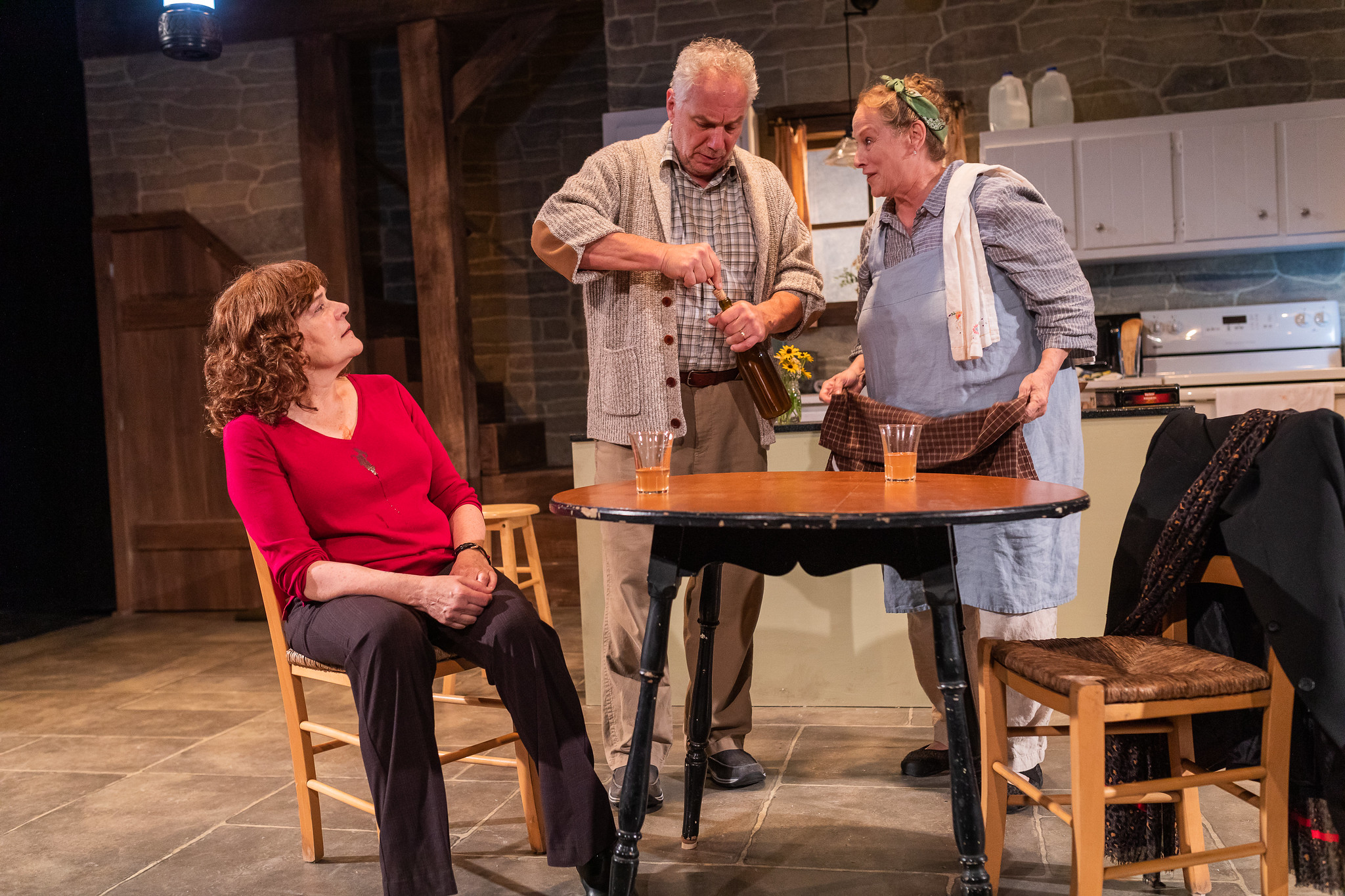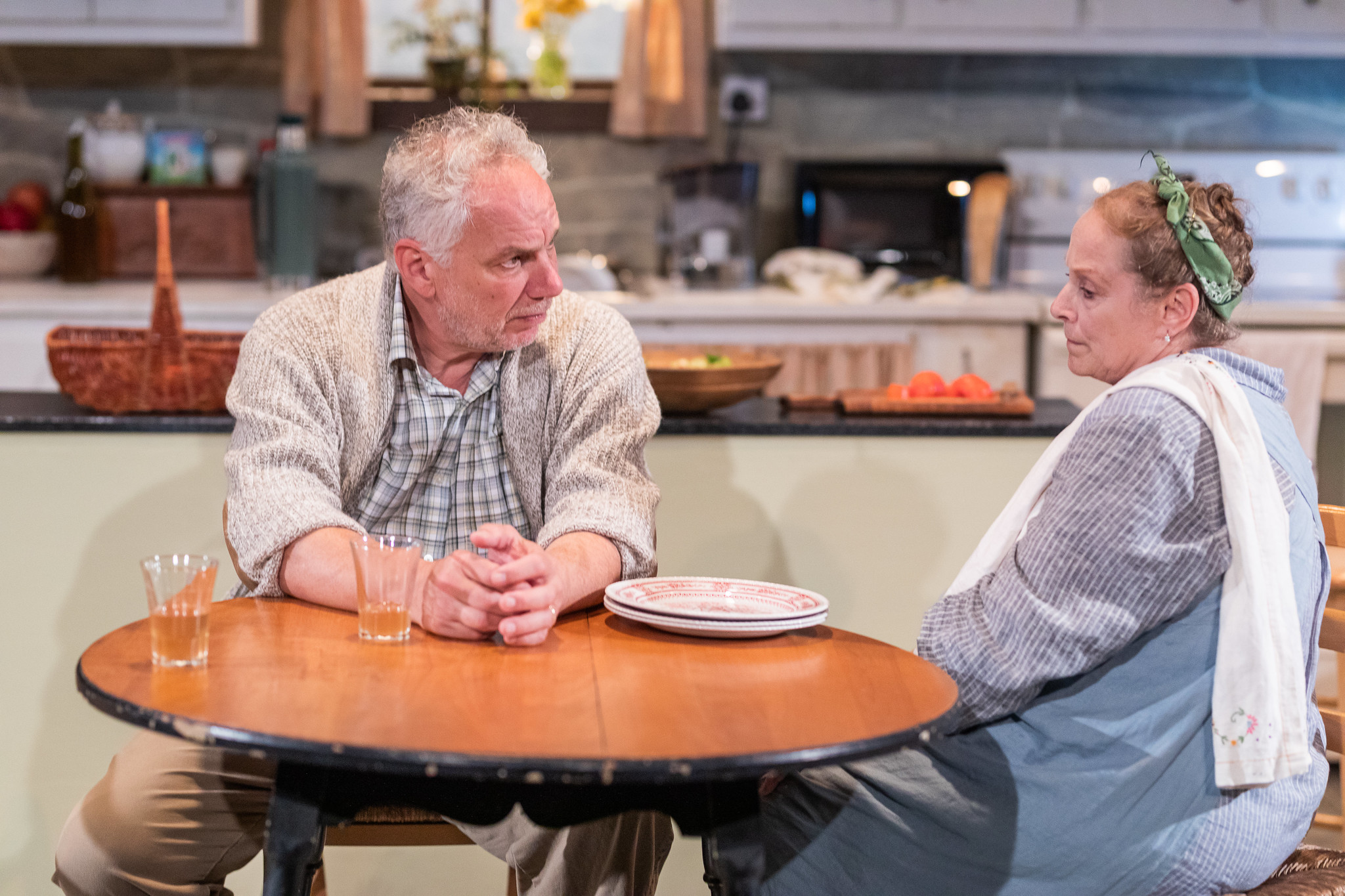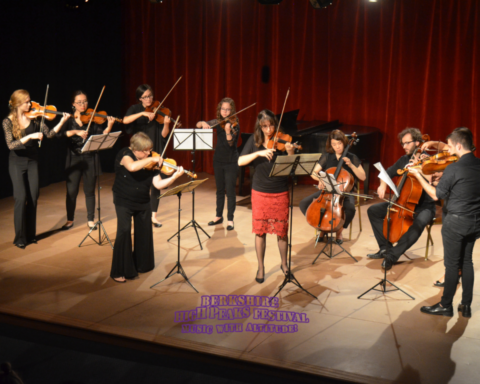Not much gives away what a slap across the psyche a drama is going to be, what a shish kebob skewer in the heart, what a sap in the kidney, like a funny first act. And the first act of The Children, an Obie Award nominee by Lucy Kirkwood, is really, really funny.
Except maybe when the woman in D-33 behind you loses her balance and plunges over the seats next to you, only to be not-quite-caught by any friend or stranger. She bounced back, unharmed, with surprising grace, but the omen was cast — This play was going to do uncomfortable things to my brain. And it would be uncomfortably funny.
Editor’s Note: This review is based on the writer’s observations of the opening performance of the production on July 21, 2019 at 3:00 p.m.
Funny in a manic, “I can’t believe these conversations are happening, not because they aren’t believable, but because they’re so much like conversations I’ve had before, and wouldn’t admit to having—maybe even not to my therapist, at least not in the first couple dozen sessions,” kind of way. The performances of Ariel Bock, Jonathan Epstein, and Diane Prusha use this slightly neurotic energy to hold the audience’s attention hostage throughout Act I and then extract an emotional ransom from the audience as Act II pulls that attention through a futuristic looking glass that may reflect more reality than fiction.
The Children, at Shakespeare & Company
By Lucy Kirkwood
Directed by James Warwick
July 18 – August 18, 2019
Elayne P. Bernstein Theatre
2 hours with a 15 minute intermission
James Warwick directed this production and, except for the fact that he was sitting behind me and over a few seats during the first act (and also failed to catch the woman), his presence was difficult to discern. And I mean that in a good way. With a killer script and actors who are masters of the craft, directors do still leave clumsy thumbprints all over productions from time to time. Not so with Warwick, who had the luxury of both. The performances of Bock, Epstein, and Prusha were immersive, in part, it seems, because Warwick deftly manages to assemble all the pieces in all the ways they were meant to fit together naturally. So many barely perceptible details were obvious contributions of Warwick’s gifts, while others were the product of the actors freedom to work their own magic. It’s impossible to know how the Venn diagram divides those characteristics of the production.
Advertisement — The Gateways Inn

When Rose shows up unexpectedly at Hazel’s, a borrowed cottage on a cliff above the English Coast, the reunion of old friends is a bit jarring at first, followed by almost normal pleasantries wound as tightly as a drum head. The challenges Hazel faces trying to offer her guest the simplest things reveal that a disaster has occurred, sometime in the not-so-distant past, and that every facet of life is degraded in one way or another.
Rose (played by Ariel Bock) and Hazel (played by Diane Prusha) are nuclear physicists, retired, having tea one evening outside the radioactive “Exclusion Zone” some miles from a nuclear power plant badly damaged in an earthquake and subsequent tsunami. As the conversation progresses, the tension makes clear that it’s not just radiation that curses the living with a half-life.

Very little can be said about the plot of this tightly constructed story, taking place in the space of an evening, without dropping some major spoilers. What can be said is that the cast was spot on from curtain to curtain. Diane Prusha does much of the heavy lifting in this production as her Hazel tries to enforce a level of normalcy both through her interactions with Rose and with Hazel’s husband, Robin (played by Jonathan Epstein), whose coping strategies suggest that the boundaries of various exclusion Exclusion Zones are a little fuzzy in his mind.
There’s a barely contained hysteria in Hazel that shines through the cracks in her level-headed façade. Secrets and sorrows from the past have sent fault lines through her confidence in herself and in reality, and those fractures have been mended not with a good strong epoxy, but with nursery school paste, which dries and flakes away throughout the evening. Prusha projects this psychological frailty with a mesmerizing array of shifting facial expressions, stances, gestures, and vocal quirks that cause Hazel to seem perpetually rocked by the aftershocks of the disaster.
From the moment Bock’s Rose arrives, we know that Hazel might wish to turn back the clock, hours or years it’s hard to say, to a time before denial was such a necessary salve. Rose lends a heaviness to the atmosphere neither Hazel nor the audience seem to want lifted to reveal the meaning of her unannounced visit. I was prepared for Hazel to shout, “Get thee back into the tempest and the Night’s Plutonian shore!” at any moment.
Much of the impact of Rose’s looming explanation is rooted in the way Bock is so often rooted in place. Her blocking places her in awkward, obstructive locations, and the effect of this is wonderfully uncomfortable. The sense that Rose is about to say something nobody wants to hear at ANY DAMN MOMENT is thick and prickly and almost (but not quite) makes up for the fact that Kirkwood shortchanged the character on lines. You know that Rose could say so much to help the audience paint-by-numbers just a bit more, but perhaps she simply trusts audiences to read into Rose’s discretion what they need to fill in the details.

Epstein’s Robin is perhaps hardest to interpret, possibly because he gives the audience so many reasons to pass judgement on him. A threadbare eccentricity cloaks his wine-soaked remorse about everything connected with the nuclear accident. We see through his forced humor, which serves as a wobbly rope bridge between the clear-eyed pragmatism of Rose and Hazel’s inability, or refusal, to come to terms with the chain reaction of events that started long, long before devastating tectonic upheaval struck.
The tense dynamic between Robin, Hazel, and Rose leaves the audience wondering who will end up standing on which side of the fault line in the end.
Ultimately though, The Children is less a story about sorrows and regrets from the past, as it is about obligations to the future. Almost an homage to a litany of particularly bad decisions, both personal and scientific, this play teases out the possibilities that are available to us when we say, “Sure. So what. Now where do we go from here?” That message seems directed at two different audiences using the same script. The usual theatre-going crowd of the over 65 set and the millennials, who have yet to walk blindly into the mistakes of their elders.
At senior citizens, this show points an accusatory finger, though offers a stony path to redemption. To younger viewers, however, the play is a treasure map that reveals the personal landmines they might avoid if they would just sit down for a couple hours and learn from the moral failings of others. Few scripts so clearly lay out the dangers of overlooking the potential for the long-term, even life-long consequences of impulsiveness. The human flaws of acting on immediate needs, of cutting corners, of betting on long-shots get us in trouble time and time again, both personally and societally.
Whatever generation you call home, The Children is a dose of bitter medicine that may improve civilization’s prognosis if we have the sense to ponder the question, “What about the children?”







